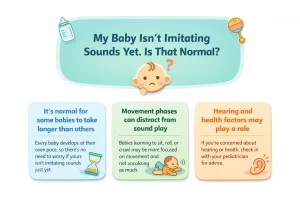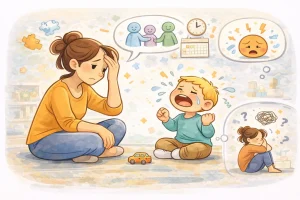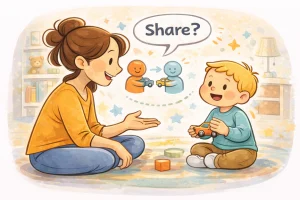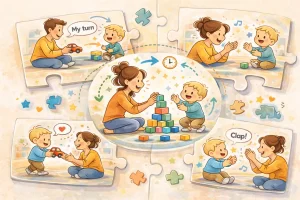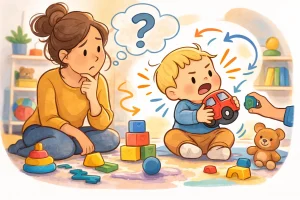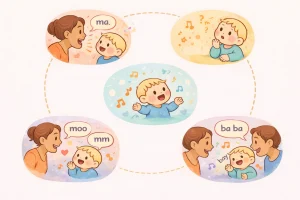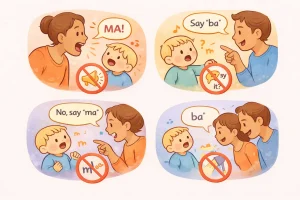Speech Delay vs Late Talker: Signs, Differences and Next Steps
Last Updated: July 11, 2025
Is your toddler not talking as much as other kids their age? You’re not alone—and it’s completely normal to wonder: Is this just late talking, or is it something more, like a speech delay? Many parents face this exact confusion. The good news? Both situations can be understood and supported with the right information. Understanding the difference between speech delay vs late talker is key to making the best choices for your child. In this article, we’ll walk you through how to tell them apart, what signs to look for, and how to take the next step—whether it’s simple at-home strategies or getting expert guidance.
Free Speech Help for Kids
Concerned about speech delays? Book a free consultation with our expert speech therapist and get guidance tailored to your child’s needs.
What Does It Mean to Be a Late Talker?
If your toddler understands what you say but isn’t saying much back, they might just be a late talker. This term is often used for children between 18 to 30 months who have good understanding and play skills but are slow to start using words. It can be worrying at first—but in many cases, it doesn’t mean there’s a serious problem.
Age-Specific Speech Benchmarks
Here’s a simple guide to when children typically start talking:
| Age | Typical Milestones |
|---|---|
| 12 months | Says 1–2 words like “mama” or “dada” with meaning |
| 18 months | Says 10–20 words clearly |
| 24 months | Uses 50+ words and starts combining two words (“more juice”) |
| 30 months | Uses short phrases and asks simple questions |
If your toddler is behind in using words but still follows instructions, shows interest in others, and plays normally, they may just need a little more time.
What Late Talkers Can Do
Many late talking toddlers:
- Follow simple directions (“Give me the ball”)
- Use gestures like pointing or waving
- Respond to their name
- Show interest in people and toys
- Understand more than they can say
This shows that while their expressive language (speaking) is delayed, their receptive language (understanding) is on track.
Why Many Late Talkers Catch Up
The great news? Most late talkers catch up by the time they’re 3–4 years old, especially with encouragement and support. Every child develops at their own pace, and a late start doesn’t always mean long-term challenges.
Still, it’s always a good idea to keep a close watch. If you’re not sure what’s typical and what’s not, resources like Wellness Hub’s expert-led programs can help guide you. Early support—even at home—can make a big difference.
Key Differences: Speech Delay vs. Late Talker
It’s not always easy to tell if your toddler is just a late bloomer or if they need extra support. So how do you know the difference between a speech delay and a late talker? The key lies in looking beyond just the number of words they say.
Let’s break it down in a simple way.
Speech Delay vs. Late Talker: What’s the Difference?
| Feature | Late Talker | Speech Delay |
|---|---|---|
| Language Understanding | Good understanding | Often struggles with understanding |
| Use of Gestures | Uses gestures like pointing, waving | May not use gestures effectively |
| Social Interaction | Engages well, makes eye contact | May avoid interaction or show limited interest |
| Play Skills | Plays normally, good imagination | May have limited or repetitive play |
| Hearing Response | Responds to name and sounds | Might not respond consistently |
| Speech Progress | Gradual improvement over time | Little or no progress without help |
| Age of Concern | Under 2.5 years, still learning | Older than 2 with multiple delays |
How to Tell if My Toddler Has a Speech Delay
Ask yourself these questions:
- Does my child struggle to follow simple instructions?
- Are they not combining words by age 2?
- Do they show little interest in talking or communicating?
- Are they not improving much, even after encouragement?
If you answered yes to most of these, it may be more than late talking.
When Should I Worry About My Toddler Not Talking?
It’s natural to compare your child to others and wonder if they’re on track—especially when it comes to speech. But every child develops at their own pace, so how do you know when it’s time to truly worry?
Here are some common red flags and signs that your child may need extra help with speech and language.
Red Flags by Age
| Age | What to Watch For |
|---|---|
| By 12 months | Not babbling or using gestures like pointing or waving |
| By 18 months | Not saying at least 10 words or not following simple directions |
| By 24 months | Not combining two words (“more juice”), limited vocabulary |
| Any age | No response to name, little eye contact, no interest in interaction |
If your toddler isn’t meeting these milestones, it doesn’t always mean something is wrong—but it’s worth taking a closer look.
Watch for Regression Signs
Sometimes a child might lose words they were already using. This is called regression, and it’s a key warning sign. For example:
- A toddler who used to say “mama” or “ball” but no longer does
- A child who stops making sounds or engaging with others
Regression should never be ignored—it often points to a deeper issue, like a developmental delay or even early signs of autism.
When Should You Reach Out for Help?
If your gut tells you something isn’t right, trust it. You should consider speaking to a professional if:
- Your child isn’t saying any words by 18 months
- They rarely try to communicate—verbally or nonverbally
- Their speech isn’t improving over time
- They’re frustrated often or throw tantrums when trying to express themselves
Early help makes a big difference. You don’t need to wait for a diagnosis to start supporting your child.
Common Causes of Speech Delay in Toddlers
If your toddler isn’t talking as expected, you might be wondering why. Understanding the possible reasons behind delayed language development can help you take the right next steps. While every child is unique, there are some common causes of speech delay that parents should be aware of.
1. Hearing Problems
Hearing plays a big role in learning to speak. If your child can’t hear clearly—whether from ear infections, fluid buildup, or hearing loss—they may not pick up words properly.
Signs to watch for:
- Doesn’t respond to sounds or name
- Turns up the volume often
- Watches your face instead of reacting to your voice
A simple hearing test can rule this out or confirm the need for help.
2. Autism Spectrum Signs
Sometimes, speech delay is part of a bigger picture—like autism. Children on the spectrum may have trouble with both speech and social interaction. That doesn’t mean your child has autism, but it’s one possible cause worth exploring.
Possible signs:
- Limited eye contact
- Doesn’t point or show things to others
- Repeats phrases without using them meaningfully (echolalia)
- Prefers routines and gets upset with changes
3. Oral-Motor or Cognitive Delays
Some children understand what’s said but struggle to move their lips, tongue, or jaw to form words. Others may have broader developmental delays that affect thinking, memory, or attention—all of which can impact speech.
What to look for:
- Difficulty chewing or blowing
- Slurred or unclear speech sounds
- Delayed walking or motor milestones too
In these cases, a combination of speech therapy and occupational support often helps build the necessary skills.
4. Environmental or Family Factors
Children learn to talk by hearing and interacting. So, if your toddler isn’t getting enough rich, real-life communication, that can slow down speech.
Contributing factors may include:
- Excessive screen time
- Limited one-on-one talking time
- Multiple languages at once (can cause temporary confusion but not long-term delay)
- Siblings speaking for them all the time
How to Help at Home: Tips for Late Talkers and Speech Delays
If you’re worried about your toddler’s speech, there’s a lot you can do at home to encourage their language development. The best part? These strategies are simple, fun, and easy to build into your daily routine. With patience and consistency, you can help your child find their voice.
1. Talk During Everyday Routines
Children learn language best through repetition and real-life situations. Whether you’re changing a diaper or setting the table, narrate what you’re doing.
Example:
“Let’s wash your hands. Turn on the water. Rub, rub, rub!”
- Use short, clear sentences
- Repeat key words often
- Emphasize action words like “open,” “go,” “eat,” “give”
2. Play and Talk Together
Playtime is the perfect opportunity to model speech in a fun, low-pressure way. Follow your child’s lead and talk about what they’re doing.
Try This:
- Name toys as you play (“Car goes vroom!”)
- Use pretend play with dolls, animals, or kitchen sets
- Keep phrases simple: “Feed baby,” “More juice,” “Push truck”
3. Read Together Every Day
Books help children hear new words in context. Choose simple, repetitive stories with big pictures and clear speech patterns.
Tips:
- Point to pictures and name them
- Use books with repeating lines (“Brown Bear, Brown Bear…”)
- Pause to let your child fill in words or make sounds
4. Sing Songs and Use Rhymes
Songs with hand movements and rhythm help children remember and mimic words. Start with familiar ones like:
- “Wheels on the Bus”
- “Old MacDonald”
- “Twinkle, Twinkle Little Star”
Add gestures like clapping, pointing, or bouncing to make it interactive.
5. Use Gestures Along With Words
Before children talk, they often use gestures to communicate. Encourage this by modeling both together.
Say and Show:
- “Bye-bye” (waving)
- “More” (hands together)
- “Up” (arms lifted)
Gestures reduce frustration and help bridge the gap to spoken words.
6. Keep It Light, Keep It Fun
Helping a late talker doesn’t mean hours of drills. It’s about weaving language into your everyday moments—with love and consistency.
When and Why to Consider Speech Therapy
If your toddler still isn’t talking much—even after trying tips at home—you might start wondering if it’s time to get professional help. That’s where speech therapy for toddlers can make a real difference.
How Speech Therapy Can Help
Speech therapists don’t just teach kids how to talk—they work on a wide range of skills depending on your child’s needs. This may include:
- Helping your child say new words
- Improving how they form sounds
- Boosting understanding of simple instructions
- Strengthening social and play-based communication
It’s not just about speech—it’s about helping your child connect with the world around them in meaningful ways.
When to Start Speech Therapy
You don’t need to “wait and see” until things get worse. In fact, the earlier you begin, the better the outcome—especially if your child:
- Isn’t using words by 18–24 months
- Has trouble combining two words by age 2.5
- Gets frustrated trying to communicate
- Shows delays in both speaking and understanding
Starting early gives your child the tools they need before habits become harder to change.
How Wellness Hub Makes It Easy for Parents
At Wellness Hub, we understand how confusing this journey can feel. That’s why we offer:
- Online speech therapy for toddlers with expert therapists
- Sessions from the comfort of your home
- Structured plans with fun, goal-based activities
- Regular progress tracking and parent guidance
- Affordable, flexible programs for every family
Whether you’re just starting to explore help or ready to begin, our team is here to support you at every step—with compassion and expertise.
Conclusion
Not sure if your child is a late talker or has a speech delay? Don’t panic. Both can be helped with the right support. Late talkers usually catch up, but some toddlers may need extra help to move forward. The key is to act early and not wait. Every child’s speech journey is different—but progress is always possible. For expert support with toddler speech development, try the BASICS Program by Wellness Hub. It’s designed for parents like you to support speech at home with easy tips and guided plans. Start early. Every word counts.
Looking for a personalized plan? Start with Wellness Hub’s speech therapy programs — expert-led, flexible, and designed for real progress at home.
Frequently Asked Questions:
1. What is the difference between a late talker and a speech delay?
A late talker usually understands well, uses gestures, and shows interest in communication, but has fewer spoken words than expected. A speech delay often includes problems with understanding, social skills, or forming words. Late talkers may catch up with time, but children with a speech delay often need early support. Knowing the difference helps you take the right action.
2. When should I worry if my toddler is not talking?
If your toddler isn’t saying any words by 18 months or not using simple phrases by age 2, it’s a good time to check with a speech expert. Trust your instincts—parents often notice the early signs.
Early help makes speech development easier and avoids future learning gaps. You don’t have to wait for a formal diagnosis to begin.
3. Is it normal for a 2-year-old to not talk?
Some children are just late talkers and may start speaking later than others. But if your 2-year-old says very few words or struggles to express needs, it’s worth getting a professional opinion.
Every child grows differently, but knowing what’s typical helps you act early. A quick check can give peace of mind or helpful next steps.
4. What are signs of speech delay in toddlers?
Signs include not saying words by 18 months, not pointing or waving, and not responding to name or instructions. If your child rarely tries to talk or seems frustrated, those are also signs.
Speech delay may also come with limited play or eye contact. Watching your child’s behavior during daily routines gives useful clues.
5. Do late talkers eventually talk normally?
Yes, many late talkers begin speaking clearly by age 3–4, especially with support at home. They usually understand language well but take more time to express themselves.
However, if there’s no steady progress, speech therapy may be helpful. Early guidance builds strong communication skills.
6. Can speech delay be a sign of autism?
Speech delay alone doesn’t mean autism, but it can be one of the early signs. Other signs include avoiding eye contact, not pointing to show interest, or repeating words without meaning.
If you’re unsure, a developmental screening can give clarity. Early detection leads to better outcomes.
7. How can I help my toddler talk more at home?
Talk to your child often using short, clear sentences during daily activities. Read simple books, sing songs, and play together to build language naturally. Gestures, repetition, and naming objects help too.
8. Should I wait or start speech therapy for my toddler now?
It’s always better to act early when it comes to speech development. If you feel unsure, getting a speech evaluation is a safe first step. Therapy works best in the early years when the brain is still developing quickly. Waiting too long may delay progress.
9. Can screen time cause speech delay?
Too much screen time and not enough real interaction can slow down speech. Children learn to talk by hearing and practicing words with real people.
Limit screen time and spend more time talking, reading, and playing with your child. Even short chats during routines help a lot.
10. Where can I find expert speech therapy for toddlers?
You can find expert-led online therapy at Wellness Hub. Our programs include live sessions, home speech plans, and support for parents. Therapy can be done from home with flexible timing and affordable options. It’s a great way to start speech support early.
About the Author:
Shravanaveena Gajula
M.Sc ., Speech and Language Pathology (5+ years of experience)
Shravanaveena Gajula is a dedicated Speech-Language Pathologist with a BASLP and an M.Sc in Speech and Language Pathology. With experience spanning multiple settings, including Wellness Hub , Veena specializes in a wide range of disorders from developmental issues in children to speech and language assessments in adults. Her expertise includes parent counseling, managing speech sound and fluency disorders, and creating individualized therapy programs. Veena is also PROMPT certified and an author of several insightful blogs on speech and language pathology, aiming to educate and assist caregivers in supporting their loved ones.
Book your Free Consultation Today
Parent/Caregiver Info:
Client’s Details:
* Error Message
